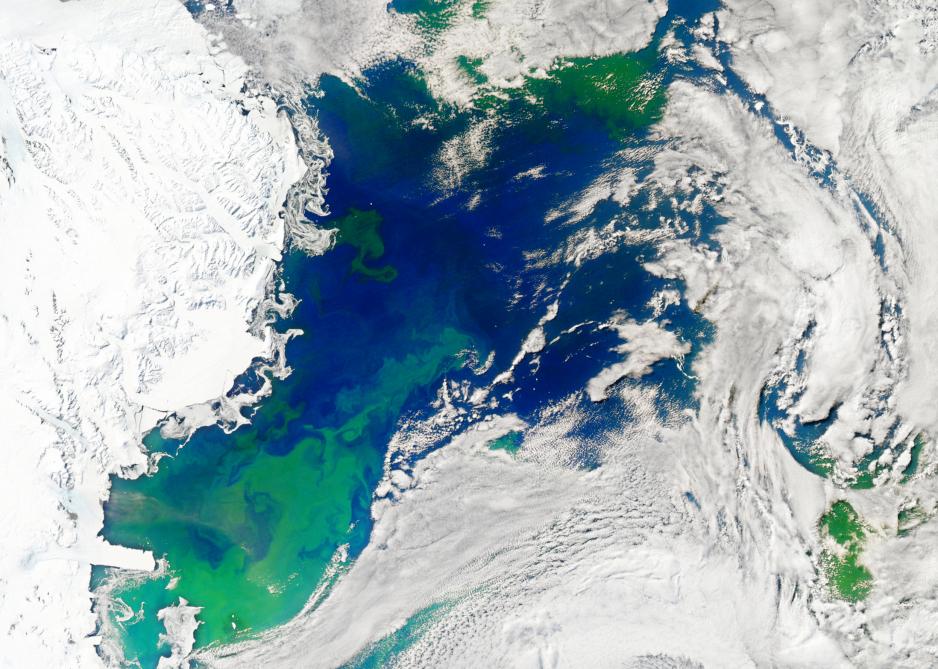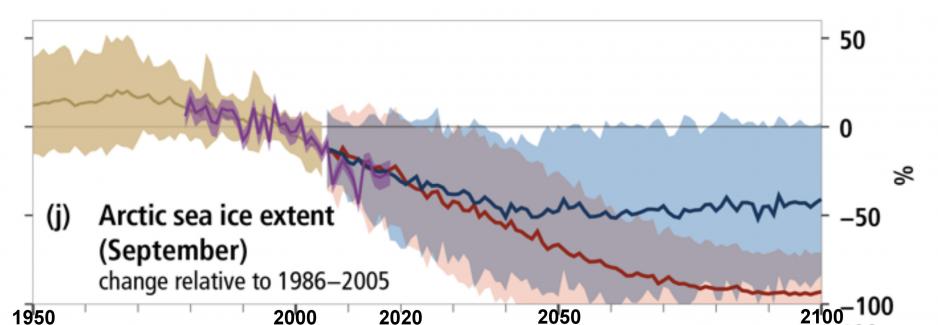UN Warns Against Impact of Climate Change on Oceans and Arctic in New Report

Springtime in Polar waters. (Source: NASA and Rawpixel under CC BY 4.0)
The UN Climate Change body releases first-ever report on oceans and the Arctic. Scientists warn that the world’s oceans are in great distress and that their ability to protect the planet from the impact of climate change is ending.
In its latest report the Intergovernmental Panel on Climate Change (IPCC) highlights the dramatic effects climate change is having on the world’s oceans, Polar regions, and high altitude regions, like the Himalayas, often referred to as “third pole.”
The three-year long survey involved more than 100 climate scientists and evaluated the impacts the changing climate has already had on these regions and what can be expected until the end of the 21st century.
While much of the public attention has been directed at the impact of climate change on land areas and surface temperatures, the world’s oceans play a vital role in the puzzle to understand and predict global warming.
Global oceans serve as heat shield
The global oceans have absorbed 93 percent of heat and may have thus been shielding the rest of the world from some of the effects of climate change. “The ocean has been acting like a sponge, absorbing heat and carbon dioxide to regulate global temperatures, but it can’t keep up,” said IPCC vice chair Ko Barrett. “The world’s oceans and cryosphere [the world’s icy areas] have been taking the heat of climate change for decades. The consequences for nature and humanity are sweeping and severe.”
Similar to regional heat waves, e.g. the one experienced by Europe this past summer, the oceans also see warming events with dramatic effects to marine life and ecosystems. While El Niño and La Niña events are common household names and have occurred in the Pacific for decades, many periods of unusually warm ocean temperatures go unnoticed by the public at large. Currently, part of the Pacific Ocean is experiencing the second-largest marine heat wave since records started in 1981. Over the past 30 years more than 50 percent of the world’s coral reefs have died as a result of rising ocean temperatures.
The Northeast Pacific Marine Heatwave, as scientists call it, began in June and affects more than four million square kilometers, the size of the European Union. While the Pacific as a whole has warmed by around one degree Celsius due to climate change, this large region has experienced temperatures 3-4 degrees Celsius above normal for the past four months.
Dramatic changes in the Arctic
The effects of rising sea temperatures have been most dramatic in the Arctic, the IPCC concludes. The Arctic Ocean has lost around 75 percent of its sea ice over the past two decades. Just last week, the region recorded its second-lowest sea ice extent since satellite record-keeping began in 1979, tied with 2007 and 2016, at 4.16 million square kilometers. And according to the new report this amount of rapid sea ice loss is “likely unprecedented for at least the past 1000 years.” The ice loss has been most dramatic among the region’s oldest and most resilient ice – 90 percent of which has been lost.
These changes in Arctic sea ice also increasingly influence weather in the mid-latitude weather according to the report. The loss of sea ice can alter the jet stream resulting in more extreme weather conditions over short periods, e.g. in Europe.
Even with immediate and drastic reduction in greenhouse gas emissions like CO2, Arctic sea ice will continue to melt for decades to come. Under the most aggressive emissions-reduction scenario the Arctic would lose another 20-30 percent of its ice before stabilizing by mid-century. The risk of an ice-free summer Arctic would be limited and occur only once every 100 years. Under a “business as usual” scenario which assumes continued rapid population growth and limited efforts to reduce emissions, summer sea ice will all but disappear by the end of this century with an ice-free Arctic Ocean occurring every three years.

Arctic sea ice extent 1950-2018 and two future scenarios. The dramatic emission reduction scenario RCP 2.6 (blue line) and the “business as usual” RCP 8.5 scenario (red line). (Source IPCC, 2019: Summary for Policymakers. In: IPCC Special Report on the Ocean and Cryosphere in a Changing Climate [H.-O. Pörtner, D.C. Roberts, V. Masson-Delmotte, P. Zhai, M. Tignor, E. Poloczanska, K. Mintenbeck, M. Nicolai, A. Okem, J. Petzold, B. Rama, N. Weyer)
Climate Change opens up the Arctic
The report also considers the effects of climate change on economic activity in the Arctic stating that shipping activity has already tripled in parts of the region. It concludes that “greater levels of Arctic ship-based transportation and tourism have socio-economic and political implications for global trade, northern nations, and economies linked to traditional shipping corridors.” It also warns that this will result in growing risks for marine ecosystems and coastal communities unless regulatory efforts to protect the region keep pace with increased shipping and activity.
Such calls are echoed by environmentalists, which have advocated for stronger protections for the Arctic Ocean, especially a ban on Heavy Fuel Oil (HFO), a dirty and almost-impossible-to-clean fuel in the case of an accident or spill.
“The IPCC Special Report makes clear that an International Maritime Organization ban on the world’s dirtiest fuel - heavy fuel oil - is imperative if we are to diminish the risks to the Arctic environment from increased shipping”, said Dr Sian Prior, Lead Advisor to the Clean Arctic Alliance, a coalition of 18 international non-governmental organizations working for a ban on heavy fuel oil from the Arctic.
This type of fuel also accelerates regional melting of sea ice as dark exhaust particles from burning HFO in ships’ engines settle on the ice, reduce its albedo, and thus absorb more heat.
“Emissions of black carbon in the Arctic, from the burning of fuels such as heavy fuel oil, further exacerbates the accelerated melting of sea ice in the Arctic caused by climate change,” Prior explained.
Some shipping companies, e.g. France’s CMA CGM, have already pledged to not operate in the Arctic Ocean. “As the IPCC SROCC points out, immediate measures are needed to curb black carbon emissions and prevent risks of spills of heavy fuel oil in the Arctic waters. With increased shipping passing through the Arctic waters of Inuit Nunaat comes the need to protect the marine ecosystem, which is part and parcel of our lifestyle and culture. We send an immediate message to global leaders to take action to make sure that our environment is not at risk of devastation and ban the use of heavy fuel oil, ensuring our communities are not negatively impacted.” said Lisa Koperqualuk, Vice-President of Inuit Circumpolar Council Canada.

